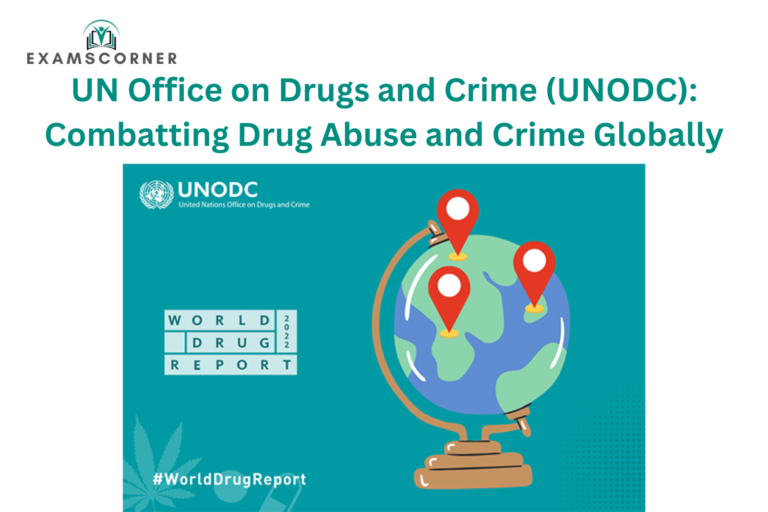The United Nations Office on Drugs and Crime (UNODC) was created with the mission of tackling drug abuse and related crimes across the world. It focuses on improving crime prevention and assisting in criminal justice reforms in various countries. The office was established in 1997 as the Office for Drug Control and Crime Prevention by merging two existing UN offices, and was renamed in 2002 to reflect its broader responsibilities.
UNODC plays a crucial role in addressing some of the most significant global challenges, such as illicit drug trafficking, drug abuse, political corruption, terrorism, and crime prevention. The office works in a coordinated and comprehensive manner to combat these issues while providing legal and technical support to countries in need.
UNODC’s Mission and Objectives
The UNODC was primarily established to help the United Nations address the growing concerns of illegal drug trafficking and drug abuse. The main goals of the office include:
- Drug Control and Prevention: Assisting countries in controlling and preventing drug abuse.
- Criminal Justice Reform: Supporting the development of strong criminal justice systems and promoting crime prevention strategies.
- Counter-Terrorism: Serving as the UN’s main body for offering legal and technical assistance to prevent terrorism.
- Raising Awareness: Spreading information about the dangers of drug abuse globally.
Reports and Initiatives by UNODC
One of the most important initiatives by UNODC is the World Drug Report, which is released annually. This report provides detailed data and analysis on global drug abuse trends, the production and use of illicit drugs, and the overall impact on public health and safety. It plays a key role in shaping international policy and supporting global efforts to reduce drug-related issues.
UNODC’s Presence in India
The UNODC has had a strong presence in India since 1987, working closely with various government ministries to tackle drug abuse, trafficking, and related crimes. The key ministries involved in these efforts include:
- Ministry of Finance (Revenue Department)
- Ministry of Home Affairs
- Ministry of Health and Family Welfare
- Ministry of Social Justice and Empowerment
- Ministry of Women and Child Development
- Ministry of Overseas Indian Affairs
India’s location near the Golden Crescent and Golden Triangle—regions notorious for illicit drug production—makes it a major player in the global drug trafficking network.
The Golden Crescent and Golden Triangle
- Golden Crescent: This area includes parts of Iran, Afghanistan, and Pakistan and is a major hub for heroin production.
- Golden Triangle: Located where the borders of Thailand, Myanmar, and Laos meet at the confluence of the Ruak and Mekong Rivers, this region was once the world’s largest producer of opium, though it has now been overtaken by the Golden Crescent.
India, positioned between these two major drug-producing areas, is a critical transit point for opiates, particularly heroin, trafficked through its borders.
India’s Role in the Global Drug Trade
According to the UNODC Report, India is one of the key hubs for the trade of illicit drugs. The report highlights the growing trend of buying drugs through online platforms on the dark web. India is at the forefront of this drug trade, with over 1,000 drug listings identified across 50 online crypto-market platforms.
The use of cryptocurrencies, such as Bitcoin, has made it more difficult to track and curb the illegal drug trade. These platforms have enabled the purchase of drugs globally, with India playing a significant role in South Asia’s drug trafficking networks.
COVID-19’s Impact on the Drug Trade
The COVID-19 pandemic had a noticeable effect on the global drug trade. According to a UNODC report titled ‘Synthetic Drugs in East and Southeast Asia’, movement restrictions during the pandemic initially led to a reduction in drug seizures. However, the report noted that there was no significant change in the supply of drugs in the East and Southeast Asia region.
The production and trafficking of methamphetamine, the main synthetic drug of concern in the region, remained largely unaffected, as this drug is manufactured and trafficked without relying on global supply chains.
The Colombo Declaration: A Regional Effort to Fight Drug Trafficking
In 2016, 18 countries in the Indian Ocean Region (IOR) adopted a resolution to make the region a Drug-Free Zone. This resolution, known as the Colombo Declaration, was the result of a meeting held in Colombo, Sri Lanka. The declaration emphasized the importance of increased cooperation among coastal states to fight drug trafficking.
Key points of the Colombo Declaration include:
- Information Sharing: Promoting the exchange of information about drug trafficking.
- Mutual Legal Assistance: Strengthening legal support between countries to combat drug trade.
- Enforcing Maritime Law: Ensuring effective enforcement of maritime laws to prevent drug trafficking by sea.
The Colombo Declaration represents a significant step in the collective efforts of nations to curb drug trafficking in the Indian Ocean region.
Conclusion
The United Nations Office on Drugs and Crime (UNODC) plays a critical role in addressing global issues like drug abuse, crime, and terrorism. By working with countries like India, which is strategically located near major drug-producing regions, the UNODC helps to combat international drug trafficking and related crimes.
As drug trafficking continues to evolve, particularly with the rise of dark web platforms and cryptocurrencies, international cooperation remains essential. Initiatives like the Colombo Declaration and ongoing support for criminal justice reform highlight the UNODC’s commitment to fighting drug abuse and crime for a safer world.



